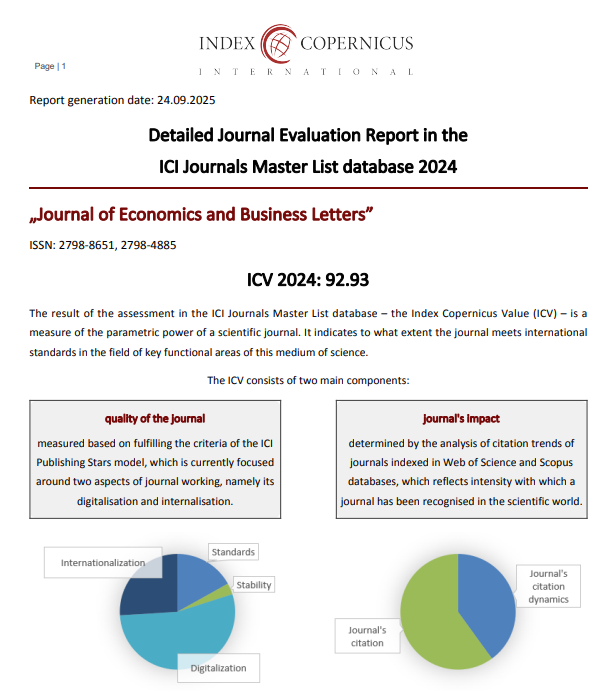Authenticity, trust, affect, and loyalty in Indonesia’s specialty coffee market: Evidence from Upala coffee & eatery
DOI:
https://doi.org/10.55942/jebl.v4i4.236Keywords:
brand authenticity, brand trust, brand affect, brand loyalty, specialty coffeeAbstract
This study investigates how brand authenticity and brand trust shape downstream brand affect and brand loyalty in a single-brand context—Upala Coffee & Eatery in East Jakarta. Using a descriptive–associative, quantitative, cross-sectional survey with purposive sampling (n ≈ 100), we measured three authenticity facets—quality commitment, heritage, and sincerity—and two trust facets—brand reliability and brand intention—alongside brand affect and brand loyalty. Measurement diagnostics (PLS-SEM, SmartPLS 4) indicate satisfactory reliability and convergent/discriminant validity (CR > 0.80; AVE > 0.50). Structurally, authenticity explains meaningful variance in trust; sincerity and quality commitment significantly raise both trust dimensions, while heritage is not a significant driver. On the outcome side, brand intention (benevolence) strongly increases brand affect and modestly increases loyalty, whereas brand reliability behaves like a hygiene factor and does not significantly lift affect or loyalty. Brand affect exerts the strongest immediate influence on loyalty. Overall, the findings show that “lived” authenticity—consistently enacted values and quality follow-through—builds benevolent trust, which, in turn, generates positive affect and repeat-patronage intentions. For emerging coffee brands, prioritizing sincerity-in-action, transparent service recovery, and tangible quality cues is likely to yield greater loyalty than relying on heritage narratives alone.
References
Beverland, M. B. (2005). Crafting brand authenticity: The case of luxury wines. Journal of Management Studies, 42(5), 1003–1029. https://doi.org/10.1111/j.1467-6486.2005.00530.x
Delgado-Ballester, E., & Munuera-Alemán, J. L. (2001). Brand trust in the context of consumer loyalty. European Journal of Marketing, 35(11/12), 1238–1258. https://doi.org/10.1108/EUM0000000006475
Fritz, K., Schoenmueller, V., & Bruhn, M. (2017). Authenticity in branding—Exploring antecedents and consequences of brand authenticity. European Journal of Marketing, 51(2), 324–348. https://doi.org/10.1108/EJM-10-2014-0633
Grayson, K., & Martinec, R. (2004). Consumer perceptions of iconicity and indexicality and their influence on assessments of authentic market offerings. Journal of Consumer Research, 31(2), 296–312. https://doi.org/10.1086/422109
Han, H., & Ryu, K. (2009). The roles of the physical environment, price perception, and customer satisfaction in determining customer loyalty in restaurant industry. International Journal of Hospitality Management, 28(4), 573–582. https://doi.org/10.1016/j.ijhm.2009.03.005
Mayer, R. C., Davis, J. H., & Schoorman, F. D. (1995). An integrative model of organizational trust. Academy of Management Review, 20(3), 709–734. https://doi.org/10.5465/amr.1995.9508080335
Morhart, F. M., Malär, L., Guèvremont, A., Girardin, F., & Grohmann, B. (2015). Brand authenticity: An integrative framework and measurement scale. Journal of Consumer Psychology, 25(2), 200–218. https://doi.org/10.1016/j.jcps.2014.11.006
Napoli, J., Dickinson, S. J., Beverland, M. B., & Farrelly, F. (2014). Measuring consumer-based brand authenticity. Journal of Business Research, 67(6), 1090–1098. https://doi.org/10.1016/j.jbusres.2013.06.001
Oliver, R. L. (1999). Whence consumer loyalty? Journal of Marketing, 63(Special Issue), 33–44. https://doi.org/10.1177/00222429990634s105
Ryu, K., & Jang, S. (Shawn) (2008). DINESCAPE: A scale for customers’ perception of dining environments. Journal of Foodservice Business Research, 11(1), 2–22. https://doi.org/10.1080/15378020801926551
Sirdeshmukh, D., Singh, J., & Sabol, B. (2002). Consumer trust, value, and loyalty in relational exchanges. Journal of Marketing, 66(1), 15–37. https://doi.org/10.1509/jmkg.66.1.15.18449
Downloads
Published
How to Cite
Issue
Section
License
Copyright (c) 2024 Sutas Syamofi

This work is licensed under a Creative Commons Attribution 4.0 International License.
















